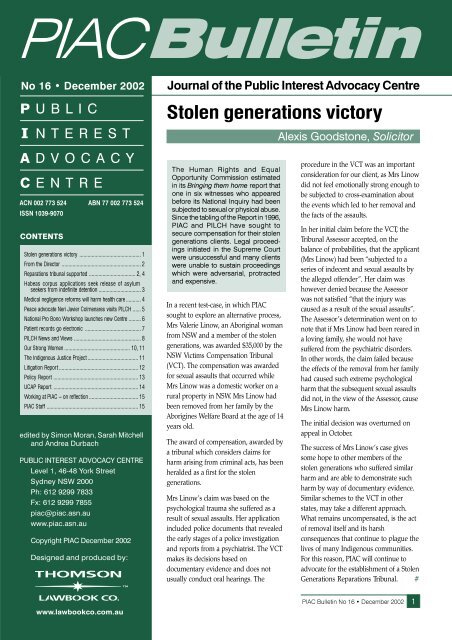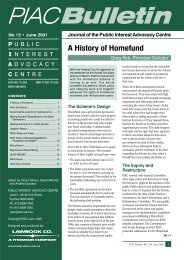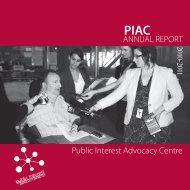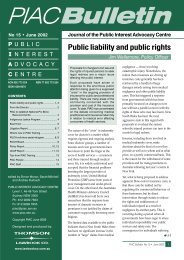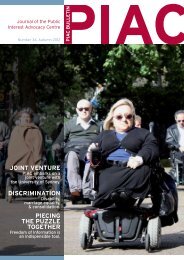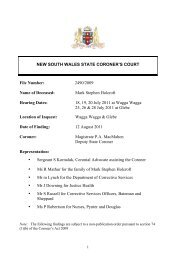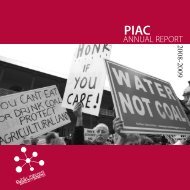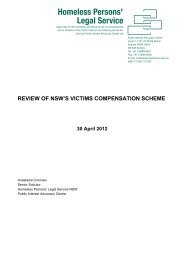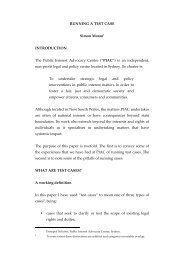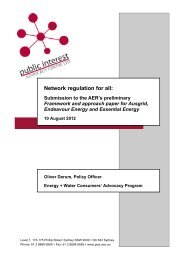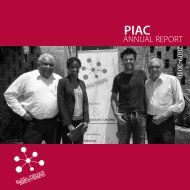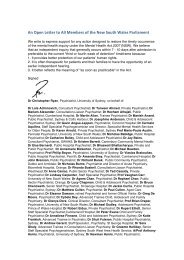PIACBulletin16 - Public Interest Advocacy Centre
PIACBulletin16 - Public Interest Advocacy Centre
PIACBulletin16 - Public Interest Advocacy Centre
You also want an ePaper? Increase the reach of your titles
YUMPU automatically turns print PDFs into web optimized ePapers that Google loves.
PIACBulletin<br />
No 16 • December 2002<br />
P UBLIC<br />
I NTEREST<br />
Journal of the <strong>Public</strong> <strong>Interest</strong> <strong>Advocacy</strong> <strong>Centre</strong><br />
Stolen generations victory<br />
Alexis Goodstone, Solicitor<br />
A DVOCACY<br />
C ENTRE<br />
ACN 002 773 524 ABN 77 002 773 524<br />
ISSN 1039-9070<br />
CONTENTS<br />
Stolen generations victory 1<br />
From the Director 2<br />
Reparations tribunal supported 2, 4<br />
Habeas corpus applications seek release of asylum<br />
seekers from indefinite detention 3<br />
Medical negligence reforms will harm health care 4<br />
Peace advocate Neri Javier Colmenares visits PILCH 5<br />
National Pro Bono Workshop launches new <strong>Centre</strong> 6<br />
Patient records go electronic 7<br />
PILCH News and Views 8<br />
Our Strong Women 10, 11<br />
The Indigenous Justice Project 11<br />
Litigation Report 12<br />
Policy Report 13<br />
UCAP Report 14<br />
Working at PIAC – on reflection 15<br />
PIAC Staff 15<br />
edited by Simon Moran, Sarah Mitchell<br />
and Andrea Durbach<br />
PUBLIC INTEREST ADVOCACY CENTRE<br />
Level 1, 46-48 York Street<br />
Sydney NSW 2000<br />
Ph: 612 9299 7833<br />
Fx: 612 9299 7855<br />
piac@piacasnau<br />
wwwpiacasnau<br />
Copyright PIAC December 2002<br />
Designed and produced by:<br />
The Human Rights and Equal<br />
Opportunity Commission estimated<br />
in its Bringing them home report that<br />
one in six witnesses who appeared<br />
before its National Inquiry had been<br />
subjected to sexual or physical abuse<br />
Since the tabling of the Report in 1996,<br />
PIAC and PILCH have sought to<br />
secure compensation for their stolen<br />
generations clients Legal proceedings<br />
initiated in the Supreme Court<br />
were unsuccessful and many clients<br />
were unable to sustain proceedings<br />
which were adversarial, protracted<br />
and expensive<br />
In a recent test-case, in which PIAC<br />
sought to explore an alternative process,<br />
Mrs Valerie Linow, an Aboriginal woman<br />
from NSW and a member of the stolen<br />
generations, was awarded $35,000 by the<br />
NSW Victims Compensation Tribunal<br />
(VCT) The compensation was awarded<br />
for sexual assaults that occurred while<br />
Mrs Linow was a domestic worker on a<br />
rural property in NSW Mrs Linow had<br />
been removed from her family by the<br />
Aborigines Welfare Board at the age of 14<br />
years old<br />
The award of compensation, awarded by<br />
a tribunal which considers claims for<br />
harm arising from criminal acts, has been<br />
heralded as a first for the stolen<br />
generations<br />
Mrs Linow’s claim was based on the<br />
psychological trauma she suffered as a<br />
result of sexual assaults Her application<br />
included police documents that revealed<br />
the early stages of a police investigation<br />
and reports from a psychiatrist The VCT<br />
makes its decisions based on<br />
documentary evidence and does not<br />
usually conduct oral hearings The<br />
procedure in the VCT was an important<br />
consideration for our client, as Mrs Linow<br />
did not feel emotionally strong enough to<br />
be subjected to cross-examination about<br />
the events which led to her removal and<br />
the facts of the assaults<br />
In her initial claim before the VCT, the<br />
Tribunal Assessor accepted, on the<br />
balance of probabilities, that the applicant<br />
(Mrs Linow) had been “subjected to a<br />
series of indecent and sexual assaults by<br />
the alleged offender” Her claim was<br />
however denied because the Assessor<br />
was not satisfied “that the injury was<br />
caused as a result of the sexual assaults”<br />
The Assessor’s determination went on to<br />
note that if Mrs Linow had been reared in<br />
a loving family, she would not have<br />
suffered from the psychiatric disorders<br />
In other words, the claim failed because<br />
the effects of the removal from her family<br />
had caused such extreme psychological<br />
harm that the subsequent sexual assaults<br />
did not, in the view of the Assessor, cause<br />
Mrs Linow harm<br />
The initial decision was overturned on<br />
appeal in October<br />
The success of Mrs Linow’s case gives<br />
some hope to other members of the<br />
stolen generations who suffered similar<br />
harm and are able to demonstrate such<br />
harm by way of documentary evidence<br />
Similar schemes to the VCT in other<br />
states, may take a different approach<br />
What remains uncompensated, is the act<br />
of removal itself and its harsh<br />
consequences that continue to plague the<br />
lives of many Indigenous communities<br />
For this reason, PIAC will continue to<br />
advocate for the establishment of a Stolen<br />
Generations Reparations Tribunal #<br />
wwwlawbookcocomau<br />
PIAC Bulletin No 16 • December 2002<br />
1
An invitation<br />
From the Director<br />
To celebrate 21 years of rocking the boat, PIAC and PILCH would be delighted if you<br />
would join Roy Slaven and HG Nelson to party in the public interest on<br />
Friday, 28 th February, 2003<br />
At the Tattersalls on Elizabeth Street, Sydney<br />
From 630pm<br />
There will be jazz and champagne, fine fare and fundraising<br />
Tickets: $220-00 (inclu gst) or $110-00 (concession)<br />
Seating is limited so it is advisable to book soon<br />
Call Fabiola Rofael on (02) 9299 7833 to make a reservation or email frofael@piacasnau<br />
Tables of 10 will be available<br />
I look forward to seeing you in February<br />
Reparations tribunal supported<br />
Amanda Cornwall, Senior Policy Officer<br />
PIAC has called for state and federal<br />
governments to review their programs for<br />
the stolen generations and to establish<br />
reparations tribunals for the stolen<br />
generations The call was made at the<br />
launch in September of restoring identity,<br />
the final report of the Moving forward<br />
consultation The call was echoed by<br />
project partners, the Aboriginal and Torres<br />
Strait Islander Commission, the National<br />
Sorry Day Committee, the Human Rights<br />
and Equal Opportunity Commission and<br />
Northern Territory stolen generations<br />
groups The South Australian, Western<br />
Australian, Victorian and Queensland<br />
governments made public statements<br />
about what they are doing to implement<br />
the report<br />
Restoring identity reveals that many<br />
government and church programs since<br />
the publication of HREOC’s Bringing them<br />
home report, have failed the stolen<br />
generations It reflects the views of<br />
Indigenous people who were consulted<br />
during the project and calls for the<br />
adoption of a number of<br />
recommendations:<br />
• programs to ensure effective access to<br />
government and church held personal<br />
and family records for Indigenous<br />
peoples;<br />
• counselling services that target members<br />
of the stolen generations effectively and<br />
meet their needs, especially at times of<br />
family tracing and reunion;<br />
• an appropriate forum, or tribunal, for<br />
Indigenous peoples to tell of their<br />
experience of forcible removal and have<br />
it officially acknowledged;<br />
• recognition by governments of the<br />
distinct identity of the stolen generations<br />
and consultations to ensure that<br />
programs meet their needs; and<br />
• compensation for the harm caused by<br />
forcible removal policies, especially<br />
where crimes were committed against<br />
people in state care<br />
The measures recommended offer an<br />
important model for all governments keen<br />
to demonstrate a commitment to the<br />
needs of the stolen generations They are<br />
modest and can be achieved with minimal<br />
financial cost<br />
In our discussions with some state<br />
governments, PIAC has been<br />
encouraged to discover that some of the<br />
recommendations have been<br />
implemented The Victorian<br />
Government has established a Stolen<br />
* p 4<br />
2 PIAC Bulletin No 16 • December 2002
Habeas corpus applications seek release of<br />
asylum seekers from indefinite detention<br />
Alexis Goodstone, Solicitor and Dr Annemarie Devereux, Senior Solicitor<br />
As the Australian Government<br />
strengthens its resolve to back an<br />
invasion of Iraq, it continues to hold<br />
Iraqi refugees in detention centres<br />
for indefinite periods, unable to<br />
send them back to a country which<br />
seems destined to encounter major<br />
destruction and destabilisation<br />
A significant number of Iraqi and Kuwaiti<br />
asylum-seekers have been detained in<br />
immigration detention centres in<br />
Australia since 1999 Their applications for<br />
refugee status have been rejected, all of<br />
their appeals have been exhausted and<br />
they now await removal The Australian<br />
Government has to date been unable to<br />
remove them In the case of the Iraqis,<br />
this is due to the practical difficulties in<br />
returning them to Iraq, including the<br />
requirement by a country through which<br />
they would transit, that they sign a<br />
voluntary consent to return In the case<br />
of Iraqi asylum-seekers, many refuse<br />
consent; in the case of Kuwaiti asylumseekers,<br />
Kuwait will not accept their<br />
return<br />
In a number of cases before the Federal<br />
Court, PIAC will represent some of these<br />
refugees, arguing that:<br />
• in the absence of reasonable prospects<br />
of removal within a set time period, the<br />
detention amounts to “indefinite<br />
detention”;<br />
• Parliament has not authorised such<br />
indefinite detention; and<br />
• the government must either remove<br />
our clients from Australia or release<br />
them from detention while<br />
negotiations for their removal continue<br />
The primary relief sought in each case<br />
will be an order in the nature of<br />
mandamus, compelling the Minister for<br />
Immigration and Multicultural and<br />
Indigenous Affairs, Mr Ruddock, to<br />
remove our clients If such relief can not<br />
be implemented “as soon as reasonably<br />
practicable”, it will be submitted that the<br />
nexus between the lawful purpose for<br />
their detention and their custody has<br />
been broken and that the court should<br />
make an order in the nature of habeas<br />
corpus, ordering their release until they<br />
can be removed from Australia<br />
PIAC will argue that the Migration Act<br />
1961 should be construed in a manner<br />
consistent with international human<br />
rights guarantees as defined in the<br />
International Covenant on Civil and Political<br />
Rights (ICCPR) In particular, our clients<br />
will seek to enforce the right to freedom<br />
from arbitrary detention<br />
We will also argue that the “time-limited”<br />
interpretation of “pre-removal” detention<br />
is the only one consistent with the<br />
Commonwealth’s constitutional power to<br />
detain persons for the purposes of<br />
migration and detention, that is that<br />
there is a time limit on the power to<br />
detain for the purpose of removal<br />
The claims will rely on the recent<br />
decision of Merkel J in Al Masri v<br />
Minister for Immigration and Multicultural<br />
and Indigenous Affairs [2002] FCA 1037 (15<br />
August 2002) In this case, brought by a<br />
Palestinian refugee in a similar situation,<br />
Merkel J found that where there is “no<br />
real likelihood or prospect of an<br />
applicant’s removal in the reasonably<br />
foreseeable future, an applicant’s<br />
continued detention is unlawful”<br />
Despite the decision, which has<br />
important implications, and Mr Al<br />
Masri’s release, the Department of<br />
Immigration was subsequently able to<br />
arrange for Mr Al Masri’s removal to<br />
Gaza<br />
Notwithstanding the factual conclusion<br />
to Al Masri’s detention, the Minister for<br />
Immigration appealed the Al Masri<br />
decision to the Full Federal Court The<br />
Minister argued that there is no time<br />
limitation on ‘pre-removal’ detention, ie<br />
that the government has the power to<br />
detain indefinitely for the purpose of<br />
removal The Human Rights and Equal<br />
Opportunity Commission (HREOC)<br />
intervened as amicus curiae (“friend of the<br />
court”) during the appeal, presenting<br />
argument on the human rights principles<br />
applicable in this area of law The decision<br />
of the Full Federal Court is pending<br />
The cases raise issues central to the rights<br />
of asylum-seekers to receive fair and just<br />
treatment Previously, there did not<br />
appear to be any limits on the<br />
Commonwealth’s power to detain<br />
asylum-seekers pending their removal<br />
This was the consequence of a broadly<br />
drafted statutory regime that had largely<br />
been untested in the courts Al Masri and<br />
other cases to come afford an opportunity<br />
to establish limits on the<br />
Commonwealth’s detention power and<br />
protect asylum-seekers from a form of<br />
detention which is clearly abhorrent to<br />
human rights law and principles<br />
A report on visits to immigration<br />
detention facilities by HREOC’s Human<br />
Rights Commissioner Dr Sev Ozdowski<br />
was tabled in Federal Parliament on 22<br />
October 2002 The report lists as one of its<br />
major concerns the length of time in<br />
detention The full report is available on<br />
the HREOC website at:<br />
http://wwwhumanrightsgovau/<br />
human_rights/idc/indexhtml #<br />
PIAC Bulletin No 16 • December 2002<br />
3
Medical negligence reforms will harm<br />
health care<br />
Amanda Cornwall, Senior Policy Officer<br />
PIAC, the Australian Consumers<br />
Association and the Heath Issues <strong>Centre</strong><br />
have joined together to urge state and<br />
federal governments to provide longterm,<br />
sustainable solutions to the crisis<br />
in medical indemnity and insurance<br />
Regrettably, the Commonwealth and<br />
NSW governments have taken the<br />
position that a short-term appeasement<br />
of some elements of the organised<br />
medical profession is sufficient to<br />
solving a complex problem with<br />
ramifications for the entire community<br />
The Commonwealth Government<br />
proposals are seen as an attempt to<br />
shore up an indemnity and insurance<br />
system that is not commercially viable<br />
by subsidising high-risk practitioners<br />
and limiting consumers’ right to sue for<br />
negligent care The proposals are<br />
contained in the reports of the Review<br />
of the Law of Negligence commissioned<br />
by the Federal Government, known as<br />
the Ipp Review<br />
PIAC is particularly concerned about a<br />
proposal that the role of judges in<br />
deciding the appropriate standard of<br />
care provided to a patient be replaced<br />
by “peer professional opinion” The<br />
proposal was recommended by the Ipp<br />
Review and is part of the Civil Liability<br />
Amendment (Personal Responsibility) Bill<br />
2002, introduced into the NSW<br />
Parliament on 23 October The bill<br />
allows the court not to rely on “peer<br />
professional opinion” if it considers the<br />
opinion is ”irrational”<br />
The provision would reverse important<br />
improvements in health care over the<br />
past decade that have supported an<br />
evidence-based approach to appropriate<br />
health care It has the potential to<br />
protect poor practitioners to the<br />
detriment of consumers and undermine<br />
the quality and safety of health care in<br />
Australia<br />
The provision is a return to the Bolam<br />
principle, a principle adopted by the<br />
English courts that makes decisions<br />
about a doctor’s standard of care a<br />
matter for medical judgement, not a<br />
matter for the courts Bolam was rejected<br />
by the Australian High Court in 1992 in<br />
Rogers v Whitaker (1992) 175 CLR 479<br />
Even in England, there has been a move<br />
away from Bolam given its potential to<br />
undermine evidence-based medicine<br />
The need for the amendment has not<br />
been established The Ipp Review<br />
recommends the amendment on the<br />
basis that judges are making medical<br />
decisions for which they are not<br />
qualified However, no examples of the<br />
claim are provided in any of the<br />
submissions to the review or in its<br />
report<br />
Reparations tribunal<br />
supported<br />
continued from p 2<br />
Generations Taskforce to provide a voice<br />
for the stolen generations and achieve<br />
co-ordination of government programs<br />
The Queensland Government’s<br />
Community and Personal Histories<br />
Section has provided access to historical<br />
state records about Aboriginal and<br />
Torres Strait Islander peoples and<br />
PIAC and the other consumer groups<br />
support a single national insurer, with<br />
cross-subsidies between the high and<br />
low risk areas of practice In the longterm,<br />
these groups support a “no fault”<br />
compensation scheme for people<br />
injured while receiving health care,<br />
similar to schemes operating in New<br />
Zealand or Sweden A number of<br />
medical colleges and many presidents of<br />
medical training colleges, also support<br />
this position<br />
PIAC supports the more considered and<br />
evidence based reforms to the medical<br />
indemnity and insurance industry put<br />
forward by the Australian Health<br />
Ministers Advisory Council Medical<br />
Indemnity Working Party and<br />
Consultative Forum PIAC has been a<br />
member of the Consultative Forum<br />
since its inception last year The<br />
Working Party has provided detailed<br />
proposals to Health Ministers on<br />
structured settlements, long-term care<br />
and most recently, published a review of<br />
legal processes #<br />
assisted many people to piece together<br />
family histories and genealogy since<br />
1992 More than half the archivists and<br />
historical researchers are Indigenous<br />
peoples<br />
Community initiatives and activities at<br />
the local level are also part of achieving<br />
rehabilitation The success of the Journey<br />
of Healing, as a community initiative<br />
with minimal funding, in bringing<br />
people together for reconciliation and<br />
healing, demonstrates the benefits of<br />
local and regional initiatives #<br />
4 PIAC Bulletin No 16 • December 2002
Peace advocate Neri Javier Colmenares<br />
visits PILCH<br />
Andrew O’Keefe, PILCH secondee solicitor (Allens Arthur Robinson)<br />
The role of the International Criminal<br />
Court (ICC) in a world increasingly<br />
confronting acts of terror and war was<br />
the subject of a lunchtime PILCH<br />
seminar by Neri Javier Colmenares, a<br />
Filipino human rights lawyer and peace<br />
advocate His address was attended by<br />
representatives of the Red Cross, the<br />
Attorney-General’s Department, the<br />
Australian Government Solicitor, the<br />
National Council of Churches and<br />
solicitors from several PILCH member<br />
firms<br />
After years of negotiations, the ICC was<br />
approved when 120 states signed the<br />
Rome Statute in 1998, and formally<br />
established when over 60 states ratified<br />
the agreement on 1 July 2002 The Court<br />
has jurisdiction to try individuals for four<br />
types of crime, being genocide, war<br />
crimes, crimes against humanity, and<br />
“the crime of aggression” Unlike the ad<br />
hoc tribunals that the UN has previously<br />
established to deal with crimes in, for<br />
example, Rwanda and the former<br />
Yugoslavia, the ICC is a permanent body,<br />
and its establishment represents the first<br />
time in history that such a Court has<br />
been recognised as having universal<br />
jurisdiction over crimes committed by<br />
individuals<br />
Of the four species of crime which the<br />
ICC is empowered to judge, only<br />
“aggression” has been left undefined by<br />
the signatories, mostly due to a concerted<br />
campaign of opposition mounted by the<br />
USA Although there is already opinio<br />
juris on the meaning of “aggression” in<br />
international law (which revolves around<br />
the notion of unjustifiably and forcibly<br />
toppling a head of state (see, for example,<br />
the ICJ Nicaragua Case), the Rome<br />
Neri Colmenares and Andrew O’Keefe at PIAC — Photo: Jim Wellsmore<br />
signatories have left the question open<br />
until they meet again in 8 years’ time In<br />
Neri’s opinion, this failure to focus on the<br />
crime of aggression is of acute concern in<br />
the current climate of the “War on<br />
Terror ”<br />
Mr Bush’s dictum at the outset of the War<br />
on Terror was unequivocal: “Either you<br />
are for us or you are against us” With<br />
that statement, the US declared a state of<br />
world war, or global aggression, in which<br />
each and every nation was implicated<br />
merely by its political position on a<br />
potential conflict The danger lies in the<br />
fact that once a person or group is<br />
labelled as “terrorist”, they are by<br />
definition an enemy of the US and its<br />
allies in the global war And once enemy<br />
groups are identified, the “coalition<br />
against terror” is given justification for<br />
interferences with the sovereignty of<br />
nations<br />
By way of example, Neri noted the case<br />
of the Abu Sayaff in the Philippines The<br />
Abu Sayaff (a group originally armed and<br />
trained by the US to fight the Soviets in<br />
Afghanistan) have for some years<br />
conducted a campaign of Muslim<br />
separatism against the Philippine<br />
government This campaign has never<br />
threatened the US, but by virtue of the<br />
methods employed by the Abu Sayaff to<br />
agitate against the Filipino government,<br />
the group has been defined as “terrorist”<br />
Therefore, according to the logic of the<br />
War on Terror, the US has a right to wage<br />
battle against it And in fact the US, like<br />
Frankenstein against his monster, has<br />
already sent nearly 2,000 soldiers to the<br />
Philippines to conduct military<br />
PIAC Bulletin No 16 • December 2002<br />
5
operations against the Abu Sayaff<br />
According to Neri, this situation will<br />
inevitably lead to armed conflict in the<br />
Philippines, and US allies in the War on<br />
Terror will inevitably be asked to<br />
support the battle Australia, as an ally,<br />
may thus be dragged into a war that<br />
breaches Filipino sovereignty<br />
The War on Terror thus not only has the<br />
power to kill people, but also the<br />
capacity to destroy societies, says Neri<br />
By pitting nations against each other,<br />
the War on Terror as currently waged<br />
strikes a blow against long-term<br />
international peace And by pitting<br />
citizens within countries against each<br />
other, the War is able to break down the<br />
notion of shared humanity on which the<br />
stability of nations, especially<br />
multicultural nations, relies “Once that<br />
happens, all manner of human rights<br />
abuses are possible, be they official<br />
(such as the internment of citizens as<br />
prisoners of war or ‘suspects’, merely by<br />
virtue of their ethnicity), or otherwise<br />
(such as the sharp rise of vilification of<br />
women who are easily identifiable as<br />
Muslim)”<br />
By defining “aggression”, says Neri, the<br />
Rome signatories may encourage nations<br />
to be “less unrestrained’ in the<br />
declaration of war In that way, the ICC<br />
may be not only be a forum to achieve<br />
justice, but may also become an effective<br />
instrument for peace At the same time,<br />
by virtue of the ICC’s indictment<br />
mechanisms, NGOs campaigning for<br />
international justice have a real<br />
opportunity to play a role in the<br />
prosecution of aggressors before the ICC<br />
So once the appropriate definitions are in<br />
place, those NGOs could offer every<br />
citizen of the world an opportunity to act<br />
as a watchperson in the war on<br />
aggression #<br />
National Pro Bono Workshop launches<br />
new <strong>Centre</strong><br />
Andrea Durbach, PIAC Director and PILCH Co-ordinator<br />
Late last year, the Attorney General,<br />
the Hon Daryl Williams AM QC MP,<br />
announced that PIAC, with national<br />
project partners, had been awarded<br />
the tender to establish a National Pro<br />
Bono Resource <strong>Centre</strong> The National<br />
<strong>Centre</strong>, initially housed at PIAC and<br />
now operating from premises at the<br />
University of New South Wales, was<br />
launched in August at a National<br />
Pro Bono Workshop held in Sydney<br />
In his opening address to the National<br />
Pro Bono Workshop, Professor David<br />
Weisbrot, President of the Australian<br />
Law Reform Commission and Chair of<br />
the National Pro Bono Task Force,<br />
highlighted a key principle which<br />
informed the work of the Task Force:<br />
“that the provision of pro bono services<br />
should be driven by client needs, and not by<br />
what lawyers are prepared to offer …There<br />
is an urgent need to ‘map client needs’ – and<br />
the availability and accessibility of<br />
corresponding legal resources”<br />
This exercise will be a major initial<br />
focus of the new National Pro Bono<br />
Resource <strong>Centre</strong>, launched by the<br />
Attorney General, the Hon Daryl<br />
Williams, at the National Pro Bono<br />
Workshop The establishment of a<br />
National Pro Bono Resource <strong>Centre</strong> was<br />
the “centrepiece” of the Task Force<br />
Report’s Recommended Action Plan<br />
which asserted a national need for a body<br />
that would develop strategies with key<br />
stakeholders to ensure the provision of<br />
targeted, quality pro bono legal services<br />
The Task Force envisaged that the new<br />
centre would seek to achieve these<br />
services by:<br />
• “promoting a culture receptive to pro<br />
bono work;<br />
• improving outreach services and<br />
community education;<br />
• providing tools and training to willing<br />
lawyers;<br />
• providing ‘matchmaking’ opportunities<br />
that will enable skills and resources to<br />
be sent from wherever they are located<br />
to wherever they are most needed;<br />
• removing structural barriers;<br />
• sharing information about successful<br />
programs in Australia and overseas”<br />
Many of these objectives and the legal<br />
needs of rural and remote communities<br />
were discussed during a one-day<br />
intensive forum convened by the <strong>Public</strong><br />
<strong>Interest</strong> Law Clearing House NSW<br />
(PILCH) and PIAC and funded by the<br />
Commonwealth Government<br />
“Overcoming Barriers: A National Workshop<br />
on Pro Bono” brought together 70 people<br />
from across Australia with expertise in the<br />
provision of legal services to explore<br />
opportunities for, and barriers to, pro<br />
bono work The workshop was also<br />
designed to assist the future work of the<br />
National Pro Bono Resource <strong>Centre</strong><br />
Gordon Renouf has been appointed the<br />
inaugural Director of the NPBRC with Jill<br />
Anderson as the <strong>Centre</strong>’s Policy and<br />
Research Officer and Liz Cotter, as<br />
Administrator The NPBRC can be<br />
contacted on 02 93857381 #<br />
6 PIAC Bulletin No 16 • December 2002
Patient records go electronic<br />
Amanda Cornwall, Senior Policy Officer<br />
Earlier this year, PIAC’s senior policy<br />
officer, Amanda Cornwall, completed<br />
a Churchill Fellowship study tour<br />
examining electronic health records<br />
schemes in Canada, England,<br />
France, Ireland and Germany The<br />
study focussed on the potential<br />
benefits of schemes that link patient<br />
information across the health system<br />
and on measures to protect privacy<br />
and confidentiality<br />
Development of electronically linked<br />
patient records is a priority in many<br />
countries as part of a new era in health<br />
service delivery They are part of a vision<br />
for health care services using telephone<br />
call centres, websites, internet linked<br />
patient records and telehealth Usually<br />
they are linked to software programs that<br />
support decision-making by health<br />
professionals, providing up-to-date<br />
information and automatic checks, such as<br />
adverse drug reactions<br />
Electronic Health Records schemes (EHRs)<br />
have been designed to perform a number<br />
of different functions The most wellestablished<br />
schemes are used to process<br />
financial claims, such as hospital billing,<br />
health insurance claims and government<br />
benefits Some current schemes keep basic<br />
patient information that would be useful<br />
to travellers, such as allergies,<br />
immunisation status and blood type<br />
The more ambitious schemes aim to<br />
provide a comprehensive, summary<br />
lifetime patient record across the whole<br />
health system The primary purpose of<br />
these schemes is to assist health care<br />
providers in diagnosis and treatment The<br />
schemes will also provide government<br />
and insurers with much more information<br />
for use in health service financing and<br />
planning, and for research purposes<br />
The Australian public has generally<br />
embraced the benefits of electronic health<br />
records, but only if the confidentiality and<br />
security of their medical record is<br />
protected People want to be able to<br />
control what information will be shared by<br />
each health care professional who is<br />
treating them Many are also concerned<br />
about the security of information<br />
transmitted over the internet Another risk<br />
is unauthorised browsing of patient<br />
records if security measures and audit<br />
trails are not in place Effective privacy<br />
laws and security measures are therefore a<br />
fundamental requirement for EHRs<br />
During her study tour, Amanda met with<br />
privacy commissioners, officials from<br />
departments of health, representatives of<br />
professional associations, insurers, health<br />
infomatics experts, academics, and<br />
consumer advocates All of the countries<br />
Amanda visited are developing and<br />
planning EHR schemes Like Australia,<br />
they are based on publicly funded health<br />
systems In all of the countries, including<br />
Australia, a high priority is a scheme that<br />
provides a complete record of patients’<br />
medications as so many injuries occur due<br />
to incomplete information about a patient’s<br />
current or past medication history<br />
Health Ministers in Australia have strongly<br />
supported EHR projects and have<br />
provided substantial funding for their<br />
development The Federal Government<br />
has initiated development of<br />
HealthConnect, an internet based network<br />
providing for national collection, storage<br />
and exchange of summary patient<br />
information across the health system The<br />
Better Medication Management System is<br />
also planned, to provide a nationally linked<br />
patient medication record using records<br />
held by doctors, pharmacists and<br />
hospitals The NSW Government has<br />
announced NSW EHR*Net to provide<br />
web-enabled access to a life time summary<br />
record of patient information held by the<br />
NSW public health system Participation in<br />
these schemes will be voluntary for patients<br />
The projects are in the research and<br />
development stage, with field tests to be<br />
conducted during 2002-2003 and<br />
introduction scheduled for late 2003 or<br />
2004 Privacy laws have been introduced<br />
at the national level and in some states<br />
and territories The result is a confusing<br />
patchwork of laws rather than a clear and<br />
consistent national privacy standard<br />
The report of the study tour, Connecting<br />
patient records, makes a number of<br />
recommendations about EHR schemes in<br />
Australia based on the experiences of<br />
Canada and Europe It recommends that<br />
the field tests for the EHR schemes in<br />
Australia should test the ability of EHRs to<br />
improve the quality of health care, not just<br />
specific functions of the schemes EHRs<br />
are only a tool, they can not in themselves<br />
improve communication between<br />
providers and patients, which is crucial to<br />
good health care The report also<br />
recommends that field tests need to be<br />
conducted for a sustained period to<br />
discern valuable lessons Field tests in<br />
England have provided a wealth of<br />
information about the best design of EHRs<br />
after testing for 2 years<br />
The report recommends that governments<br />
need to do more to achieve a nationally<br />
consistent framework for privacy laws in<br />
the health sector, a fundamental building<br />
block for EHRs It also recommends that<br />
privacy commissioners play a more active<br />
and public role in providing advice on the<br />
privacy and security aspects of EHRs In<br />
France and Ontario, Canada, for example,<br />
the privacy commissioners provided<br />
publicly available reviews of proposed<br />
EHR schemes<br />
Connecting patient records, which has been<br />
sent to state and federal governments for<br />
their consideration, is available from<br />
PIAC #<br />
PIAC Bulletin No 16 • December 2002<br />
7
PILCH News and Views<br />
NSW Law and Justice<br />
Foundation Justice<br />
Awards<br />
Freehills solicitor and past PILCH<br />
secondee Peter Olds was presented with<br />
the PILCH Award at the NSW Law and<br />
Justice Foundation 2002 Justice Awards’<br />
dinner on 11 November 2002<br />
The award was presented to Peter in<br />
recognition of the outstanding<br />
contribution he made to the PILCH<br />
Temporary Protection Visa (TPV)<br />
Project during and following his<br />
secondment Since December 2001<br />
PILCH had been part of a working<br />
group formed to provide an organised<br />
response to the expected large number<br />
of asylum seekers applying for<br />
permanent protection in 2002-2003<br />
Peter was instrumental in initiating a<br />
PILCH project to seek the assistance of<br />
PILCH member lawyers to provide<br />
access to legal services to asylum<br />
seekers holding temporary protection<br />
visas and seeking permanent<br />
protection Over 150 PILCH member<br />
lawyers offered their assistance on a<br />
pro bono basis Training of the<br />
volunteer lawyers is now complete and<br />
assistance is being co-ordinated by the<br />
project co-ordinator at the working<br />
group member Refugee Advice and<br />
Casework Service<br />
Practising in the <strong>Public</strong><br />
<strong>Interest</strong><br />
The PIAC/PILCH Practising in the <strong>Public</strong><br />
<strong>Interest</strong> Course is now entering its third<br />
year and is being conducted twice a<br />
year with participating universities<br />
In July 2002 PIAC and PILCH<br />
conducted the course as a Winter<br />
School in conjunction with the<br />
University of Western Sydney (Nepean)<br />
and Macquarie University PILCH firm<br />
Gilbert & Tobin hosted the course<br />
As part of the Winter School law<br />
students from the two universities<br />
undertook placements with PILCH<br />
member firms Blake Dawson Waldron,<br />
Gilbert & Tobin, Allens Arthur<br />
Robinson, Freehills and Mallesons<br />
Stephen Jaques Students also<br />
undertook placements with the<br />
Environmental Defender’s Office,<br />
Clayton Utz, the Human Rights and<br />
Equal Opportunity Commission, the<br />
office of the Hon Dr Meredith<br />
Burgmann MLC, Maurice Blackburn<br />
Cashman and the Legal Aid<br />
Commission of NSW<br />
PILCH referrals of note<br />
National Pro Bono Research <strong>Centre</strong><br />
PILCH member firms Allens Arthur<br />
Robinson, Harmers Workplace Lawyers<br />
and Freehills have provided extensive<br />
pro bono legal services to assist with<br />
the establishment of the <strong>Centre</strong><br />
Tax<br />
With changes to the definition of<br />
“charity” announced by the Federal<br />
Treasurer in August, many<br />
organisations have approached PILCH<br />
for assistance in attaining tax<br />
concessions and deductibility status<br />
Freehills assisted a newly incorporated<br />
charity that distributes food to needy<br />
families to apply for a range of tax<br />
benefits Coudert Brothers have been<br />
assisting with drafting submissions on<br />
an appeal against a decision of the ATO<br />
on behalf of a family support service<br />
Blake Dawson Waldron has been<br />
examining the constitution of a<br />
philanthropic funding organisation to<br />
ensure compliance with ATO<br />
deductibility guidelines<br />
Incorporation<br />
Gadens Lawyers provided advice to a<br />
peak refugee support and advocacy<br />
body on its options for incorporation<br />
Mallesons Stephen Jaques has been<br />
assisting three large charities with a<br />
feasibility study on amalgamation<br />
Deacons has been advising in the<br />
establishment of a corporate structure<br />
for a regional group that provides<br />
emergency assistance to women and<br />
children in situations of domestic<br />
violence PricewaterhouseCoopers<br />
Legal is providing similar advice for the<br />
publishers of early reading materials for<br />
children<br />
Workplace issues<br />
Corrs Chambers Westgarth are<br />
providing legal advice to a child-care<br />
centre about its potential duties toward<br />
pregnant staff members in light of a<br />
recent NSW Court of Appeal decision<br />
A company which publishes<br />
educational resources for marginalised<br />
groups is being assisted by Baker &<br />
McKenzie in relation to a key staff<br />
member’s migration to Australia Peter<br />
Maiden, barrister, has advised a peak<br />
body for disability service providers on<br />
the ramifications of assisting disabled<br />
clients to access sex workers Gilbert &<br />
Tobin have provided PILCH with pro<br />
forma costs agreements for use by pro<br />
bono lawyers and are advising on the<br />
consequences for costs awards of acting<br />
pro bono<br />
Refugees<br />
Graham Jones Lawyers have drafted a<br />
contract designed to protect the<br />
anonymity of refugees and asylum<br />
seekers who make comments to the<br />
media, in order that their families in<br />
their home countries are not<br />
endangered Freehills’ Canberra office<br />
provided an advice on registration<br />
requirements for solicitors who had<br />
volunteered to assist refugees with<br />
applications for permanent protection<br />
8 PIAC Bulletin No 16 • December 2002
Stephen Lloyd, barrister, prepared<br />
submissions and appeared in a<br />
deportation matter in which it was<br />
argued that the best interests of the<br />
children involved had not been<br />
sufficiently considered And Sally<br />
Habibi at Carroll & O’Dea has agreed<br />
to provide assistance with the<br />
translation of legal documents into<br />
Arabic so that lawyers for refugees and<br />
asylum seekers in detention may<br />
provide clients with advice in a<br />
comprehensible form<br />
Discrimination<br />
Minter Ellison advised a disabilities<br />
legal service on the implications of the<br />
Civil Liability Act 2002 for<br />
discrimination actions Kate Eastman,<br />
barrister, advised in a disability<br />
discrimination matter in which a child<br />
had been excluded from schools on the<br />
basis of learning difficulties Mark<br />
Brabazon, barrister, gave advice on<br />
jurisdictional issues and merits in an<br />
appeal brought to the Administrative<br />
Decisions Tribunal for matters of<br />
alleged racial discrimination Bill<br />
McManus, barrister, has agreed to<br />
advise on issues surrounding a dispute<br />
between an employment agency and<br />
two intellectually disabled job-seekers<br />
Dr Holger Sorensen of Ground Floor<br />
Wentworth is advising a group of<br />
disabled clients upon their entitlements<br />
to monies accrued as interest on their<br />
savings and held in trust<br />
Other matters<br />
Allens Arthur Robinson advised a<br />
community group on its planned<br />
appeal against a development consent<br />
which had the effect of significantly<br />
lessening local access to recreational<br />
facilities John Robson, barrister, is<br />
assisting a residents group with the<br />
drafting of documents in their appeal<br />
against the planning minister’s consent<br />
Chris Greiner, Partner, Blake Dawson Waldron and PILCH President with Peter Olds,<br />
Solicitor, Freehills, winner of the PILCH Award at the NSW Law and Justice<br />
Foundation 2002 Justice Awards<br />
to a waste terminal Mr Peter Bruckner<br />
of 5 Wentworth Chambers settled<br />
appeal documents in a victims<br />
compensation matter The client’s<br />
subsequent victory was described in<br />
the media as a “major victory for the<br />
stolen generations”<br />
PILCH News<br />
The convening of the National Pro<br />
Bono Workshop provided a timely<br />
opportunity for members of the Boards<br />
and staff of PILCH organisations in<br />
NSW, Victoria and Queensland to meet<br />
and address issues of common interest<br />
and concern The meeting, hosted by<br />
PILCH member firm Blake Dawson<br />
Waldron, considered proposals to<br />
create a national identity and network,<br />
opportunities to undertake joint and<br />
national projects and ways in which<br />
PILCH could assist the work of the<br />
NPBRC<br />
Secondee solicitors continue to play a<br />
vital role in maintaining the PILCH<br />
— Photo: Thanks to the Law and Justice Foundation<br />
assessment and referral scheme as well<br />
as assisting with PILCH projects,<br />
training and promotional activities<br />
During its ten years of operations<br />
PILCH member firms have provided a<br />
total of 32 solicitors on secondment to<br />
the Clearing House<br />
Bassina Farbenblum, solicitor from<br />
Minter Ellison, completed a three<br />
month secondment in August 2002<br />
Our current solicitor on secondment is<br />
Andrew O’Keefe from Allens Arthur<br />
Robinson Andrew completes his<br />
secondment in November and will be<br />
followed by solicitor Sharon Sekulic<br />
from Mallesons Stephen Jaques<br />
PILCH member firms Freehills and<br />
Allens Arthur Robinson have agreed to<br />
provide secondee solicitors in 2003 If<br />
you are able to provide secondee<br />
solicitors to PILCH during next year, or<br />
have any queries in relation to<br />
secondments, please contact Sandra<br />
Stevenson or Andrea Durbach at<br />
PILCH on 02 9299 7833 #<br />
PIAC Bulletin No 16 • December 2002<br />
9
Our Strong Women – Indigenous Women, Law<br />
and Leadership Project<br />
At a celebration in Darwin on 12 August<br />
2002 the National Network of Indigenous<br />
Women’s Legal Services (NNIWLS)<br />
launched its national advocacy training<br />
program, Our Strong Women Indigenous<br />
Women, Law and Leadership The program<br />
is a joint project of NNIWLS and PIAC<br />
and is funded by the Commonwealth<br />
Office of the Status of Women under the<br />
National Women’s Development<br />
Program<br />
Carolyn Grenville, Training Co-ordinator<br />
PIAC’s training co-ordinator, Carolyn<br />
Grenville, has been working closely with<br />
the NNIWLS to present a series of twoday<br />
workshops for Indigenous women in<br />
nine locations around Australia During<br />
this year, Carolyn has conducted<br />
workshops with women in Darwin,<br />
Broome, Port Augusta, Kalgoorlie,<br />
Townsville and Brisbane<br />
The training aims to enhance community<br />
leadership skills amongst Indigenous<br />
women and promote their status and<br />
interests at a community, regional, state<br />
and national level It also seeks to change<br />
policies and improve the quality and<br />
delivery of services to Indigenous<br />
communities<br />
Participants learn about systems of<br />
government, challenging government<br />
decisions, effective campaigning and<br />
community representation In addition,<br />
they learn media, negotiation and<br />
lobbying skills<br />
The Darwin workshop saw Indigenous<br />
women travel from Katherine and Alice<br />
Springs as well as Darwin For the<br />
Broome workshop, Indigenous women<br />
came from across the Kimberley and the<br />
Pilbara and many participants travelled<br />
long distances from Kununarra and<br />
Fitzroy Crossing<br />
All workshops, which attracted capacity<br />
attendance, have produced advocacy<br />
action plans initiated and designed by<br />
participants for working towards<br />
achieving specific objectives Participants<br />
Photos show participants at the Broome<br />
and Darwin workshops of the Our<br />
Strong Women, Indigenous Women,<br />
Law and Leadership program, August<br />
2002 — Photos: Carolyn Grenville<br />
have reported that the workshops have<br />
made them feel empowered, have<br />
increased their knowledge across a range<br />
of activities and enabled them to use the<br />
new networks and skills for concrete<br />
purposes For example, women who<br />
attended the workshop in Broome have<br />
committed to establish the first Pilbara-<br />
Kimberley Aboriginal Women’s Network<br />
and women in Darwin have undertaken<br />
to work on ensuring that Indigenous<br />
women have a stronger voice in the<br />
Northern Territory and to achieve a<br />
specialist legal service for Indigenous<br />
women in Darwin Port Augusta women<br />
mapped out plans to work for a new<br />
counselling and healing centre in town<br />
* p 11<br />
10 PIAC Bulletin No 16 • December 2002
The Indigenous Justice Project – One Year On<br />
Shahzad Rind, Solicitor<br />
The Indigenous Justice Project was<br />
initiated by PIAC in 2001, with financial<br />
support from PILCH member firm,<br />
Allens Arthur Robinson The project<br />
aims to:<br />
• strengthen PIAC’s links with Indigenous<br />
organisations;<br />
• identify public interest issues which<br />
impact on Indigenous people and<br />
communities; and<br />
• conduct litigation, policy work and<br />
training on behalf of and for indigenous<br />
clients<br />
In November last year, I was employed as<br />
the project’s inaugural solicitor I had<br />
previously worked as a solicitor with the<br />
Aboriginal Legal Service, primarily in<br />
criminal law, and with ATSIC, in the area<br />
of commercial law My first year at PIAC<br />
has been packed with a variety of new<br />
challenges I have worked with<br />
Indigenous clients, particularly in the<br />
area of race discrimination and visited<br />
numerous Indigenous organisations to<br />
assess the needs of Indigenous<br />
communities In addition, I have worked<br />
on PIAC’s Stolen Generations project and<br />
with PIAC’s Utility Consumers <strong>Advocacy</strong><br />
Project (UCAP) to design a scheme which<br />
will resolve non-payment of accounts by<br />
Indigenous clients at the ‘Block’ in<br />
Redfern and manage future payment<br />
arrangements in consultation with the<br />
‘Block’ residents, community<br />
organisations and Energy Australia<br />
I also have presented aspects of PIAC’s<br />
training course, Work the System and<br />
lectured law students at Tranby<br />
Aboriginal College on the legal system,<br />
public interest litigation and stolen<br />
generations litigation While working at<br />
PIAC I have become an executive<br />
member of Ngalaya Aboriginal<br />
Corporation, a non-profit organisation<br />
committed to assisting Aboriginal and<br />
Torres Strait Islander people interested in<br />
a legal career at all stages of their<br />
education and professional development<br />
I am also a member of the NSW Law<br />
Society Indigenous Lawyers Taskforce<br />
which aims to increase the numbers of<br />
Indigenous lawyers within the legal<br />
profession and I participate in the UTS<br />
mentoring program which seeks to<br />
prepare Indigenous law students for the<br />
realities of legal practice<br />
My first year at PIAC has exposed me to<br />
an incredible array of work and people<br />
and issues On both a professional and<br />
personal level, I have gained an insight<br />
into areas of law which can bring about a<br />
positive change to some of the legal<br />
issues which impact on the indigenous<br />
community in NSW, particularly in areas<br />
not traditionally undertaken by the<br />
Aboriginal Legal Service which tends to<br />
focus more on criminal and family law<br />
Our Strong Women<br />
continued from p 10<br />
Workshops in 2003<br />
Further workshops are planned for<br />
February 2003 in Hobart and<br />
Melbourne A workshop will also be<br />
held in NSW and the possibility of a<br />
workshop in Canberra is also being<br />
explored<br />
Indigenous women interested in the<br />
project should contact:<br />
• Our Strong Women project coordinator<br />
Libby Carney, Indigenous<br />
Legal Worker, Aboriginal Women’s<br />
Outreach Project at the Top End<br />
Women’s Legal Service in Darwin on<br />
08 8941 9989, or<br />
Importantly, PIAC is an autonomous<br />
organisation and can assist Indigenous<br />
clients in seeking redress across a broad<br />
range of legal issues, using a variety of<br />
strategies I hope to continue to build our<br />
links with the Indigenous communities in<br />
NSW and to learn from each other and<br />
share our experiences of the legal system in<br />
providing an informed and professional<br />
service to the community<br />
I wish to acknowledge the kind support of<br />
all PIAC staff and Allens Arthur Robinson,<br />
specifically David Robb, Francene Kanaar<br />
and Phillip Cornwell<br />
Postscript:<br />
Following a review of the Indigenous<br />
Justice Project, we are delighted to<br />
announce that Allens Arthur Robinson<br />
have confirmed that they will renew<br />
their funding of the Project for a further<br />
two years Shaz Rind will continue on in<br />
the position as PIAC’s Indigenous<br />
Solicitor #<br />
• Carolyn Grenville at PIAC on 02 9299<br />
7833,<br />
who will put you in touch with your local<br />
workshop organiser<br />
Postscript<br />
Our Strong Women project coordinator<br />
Libby Carney has just<br />
reported that one of the Our Strong<br />
Women – Indigenous Women, Law &<br />
Leadership graduates, Dianne Borella,<br />
has successfully been elected to sit on<br />
the Yilli Reung ATSIC Regional Council<br />
for Darwin Libby writes: “Dianne<br />
decided to nominate for the ATSIC<br />
elections during the OSW course We<br />
identified a need for more Indigenous<br />
women to run for council and she has,<br />
and she did it” #<br />
PIAC Bulletin No 16 • December 2002<br />
11
Litigation Report<br />
Simon Moran, Principal Solicitor<br />
The last 6 months have seen PIAC’s<br />
litigation practice initiate a significant<br />
number of cases in relation to the<br />
rights of asylum seekers As discussed<br />
in the habeas corpus article<br />
earlier in the Bulletin, much of the focus<br />
of this work is on the rights of asylumseekers<br />
held in indefinite detention<br />
Government Accountability<br />
The case of refugee Simon Odihambo,<br />
addresses the rights of minors when making<br />
applications for refugee status Simon was<br />
an unaccompanied minor when he arrived<br />
in Australia, having stowed away on a boat<br />
in Mombassa, Kenya Simon’s application<br />
for refugee status was refused by both the<br />
Minister for Immigration and by the<br />
Refugee Review Tribunal (RRT) on review<br />
His application to the High Court, which<br />
seeks special leave to appeal the decision of<br />
the Full Federal Court focuses on the need to<br />
ensure that minors making applications for<br />
refugee status be provided with<br />
independent legal assistance before the RRT,<br />
as opposed to the assistance of the Minister<br />
for Immigration, who is deemed to be the<br />
guardian of minors in detention John<br />
Basten QC and Robert Lindsay are briefed<br />
to appear before the High Court<br />
A community organisation concerned with<br />
high-rise developments, Save Our Suburbs<br />
(SOS), sought registration as a political party<br />
in time to participate in the 2003 State<br />
Elections Although the application<br />
complied with legislative requirements, the<br />
State Electoral Commissioner elected not to<br />
register SOS until they had complied with a<br />
test set by the Commissioner Counsel<br />
Jeremy Kirk, argued before Justice Burchett<br />
of the Supreme Court that the test imposed<br />
by the Commissioner was ultra vires and<br />
sought an order of mandamus that the<br />
Commissioner register the party on a date<br />
before the cut-off date for registration for<br />
the 2003 State election While determining<br />
that the Commissioner’s policy was ultra<br />
vires, Burchett J did not order the backdated<br />
registration of SOS as the Commissioner<br />
did not have power to backdate<br />
registration The Commissioner decided<br />
not to appeal the decision and Parliament<br />
subsequently amended the Parliamentary<br />
Electorates and Elections Act to validate the<br />
Commissioner’s test, deem the registration<br />
of SOS to have been on 1 March 2002 and<br />
gave the Commissioner power to amend<br />
the Register of Parties accordingly SOS can<br />
now fully participate in the 2003 State<br />
Elections<br />
The rights of the child and the principles of<br />
the Teoh case, were the key focus of a case<br />
which challenged the cancellation of our<br />
client’s permanent resident visa on the<br />
grounds that he did not pass the character<br />
test under the Migration Act given his<br />
criminal record Mr Untan came to<br />
Australia from Romania as a refugee 20<br />
years ago and has an Australian wife and<br />
three Australian children The cancellation<br />
of his visa means that he will be deported<br />
to Romania Mr Untan applied to the<br />
Federal Court for a review of the decision to<br />
cancel his visa arguing that the Minister<br />
had failed to consider certain evidence<br />
concerning the best interests of his children<br />
and the interest of his wife as their<br />
guardian Branson J found that there had<br />
been a denial of procedural fairness to Mr<br />
Untan’s wife (who represented the<br />
childrens’ interests) however the privative<br />
clause rendered the decision immune from<br />
judicial review<br />
Consumer Protection<br />
In August 2002 the long-running problem<br />
gambling test case Reynolds v Katoomba RSL<br />
Club came to an end when the High Court<br />
refused an application for special leave to<br />
appeal The Court of Appeal rejected Mr<br />
Reynold’s contention that the Club had<br />
engaged in unconscionable conduct and it<br />
breached its duty of care to Mr Reynolds by<br />
cashing cheques for him when they knew he<br />
was a problem gambler While the case has<br />
been on foot a number of significant<br />
legislative changes to the Registered Clubs Act<br />
and the Liquor Act which protect the rights of<br />
consumers<br />
In November Coroner Milledge handed<br />
down her findings in the coronial inquiry<br />
into the death of Jessica Michalik at the Big<br />
Day Out in 2001 The Coroner heard<br />
extensive evidence during a five week<br />
hearing at which Jessica’s father, Mr George<br />
Michalik was represented by PIAC and<br />
James Hmelnitsky of counsel The Coroner<br />
found that the promoters of the BDO had<br />
not assessed the safety risks to patrons and<br />
that they were dependent upon a reactive<br />
plan as ‘their pro-active approach was sadly<br />
lacking’ She made ten recommendations,<br />
“The Jessica Recommendations”, which<br />
included the establishment of a working<br />
party, auspiced by Workcover, to develop<br />
industry standards for safety at rock festivals<br />
and the establishment of a regulatory<br />
authority for licensing events<br />
Update<br />
PIAC’s litigation continues to be involved a<br />
number of discrimination actions, many of<br />
which involve complaints of race<br />
discrimination by indigenous clients Age<br />
discrimination is the subject of two appeals<br />
to the Full Federal Court in the matter of<br />
Peacock v HREOC & the Commonwealth, in<br />
which PIAC is acting for the complainant<br />
who has alleged that age was a decisive<br />
criterion applied when a public service<br />
employer refused an award of discretionary<br />
retirement provisions<br />
Bassina Farbenblum has taken up a one year<br />
position as a solicitor with PIAC Her<br />
position is funded by the <strong>Public</strong> Justice<br />
Project The objective of the Project is to<br />
sponsor junior lawyers to undertake public<br />
interest litigation The Project is sustained by<br />
donations from organisation and<br />
individuals Already Bassina has made a<br />
significant impact instructing counsel in the<br />
Untan and Peacock matters #<br />
12 PIAC Bulletin No 16 • December 2002
Policy Report<br />
Dr Patricia Ranald, Principal Policy Officer<br />
Local councils seek<br />
consultation in Trade in<br />
Services (GATS)<br />
negotiations<br />
In an unprecedented move to link local<br />
and global regulation, Marrickville,<br />
Waverly and Leichhardt councils and<br />
the NSW Local Government<br />
Association Conference recently passed<br />
resolutions asking for the Federal<br />
Government to consult about the<br />
implications for local government of<br />
the WTO negotiations on Trade in<br />
Services (GATS) PIAC and other<br />
community organisations have been<br />
raising these issues with councils as<br />
part of their community education<br />
campaign about the impact of GATS on<br />
essential services<br />
The GATS agreement signed by<br />
Australia and other governments in<br />
1994 treats services purely as traded<br />
goods and promotes international trade<br />
in them Although some GATS rules<br />
apply to all services, many only apply<br />
to those services each government<br />
agrees to list in the agreement GATS<br />
has some rules which recognise the<br />
right of governments to regulate<br />
services and to provide and fund public<br />
services, and most public services have<br />
not been included in the agreement<br />
However, there are now proposals to<br />
change these rules<br />
Governments are being asked to<br />
increase the range of services included<br />
in the GATS agreement Requests in the<br />
negotiations from the European Union,<br />
for example, asked for Telstra, Australia<br />
Post and water services, which would<br />
mean privatisation of these services<br />
There are also proposals to change<br />
GATS rules to reduce the right of<br />
governments to regulate by declaring<br />
that some regulation of services should<br />
be “least trade restrictive”<br />
GATS rules are binding on all levels of<br />
government but there has been little if<br />
any consultation with local<br />
government about the negotiations and<br />
their implications<br />
A recent study by the Canadian<br />
Environmental Law Association (found<br />
at wwwpolicyalternativesca) identified<br />
areas of local government services and<br />
regulation which could be affected by<br />
the GATS negotiations The services<br />
identified included water and sewerage<br />
services, waste management, zoning<br />
regulations, library services and<br />
community services like childcare<br />
The resolutions passed by local councils<br />
and the NSW Local Government<br />
Association Conference stressed that<br />
public policy regarding the regulation,<br />
funding and provision of essential<br />
services should be made democratically<br />
by governments at the national, state<br />
and local level, and that such services<br />
should not be included in trade<br />
agreements They called for full<br />
transparency and consultation on GATS<br />
with state and local government See<br />
wwwaftinetorgau for a copy of the<br />
resolution<br />
PIAC Submission on<br />
ASIO anti-terrorism<br />
legislation defends<br />
human rights<br />
In October the Senate voted to refer the<br />
ASIO Legislation Amendment (Terrorism)<br />
Bill to the Senate Legal and<br />
Constitutional Committee for inquiry<br />
The terms of reference include the<br />
development of an alternative regime<br />
not conducted by ASIO to obtain<br />
information relating to terrorism, and<br />
the protection of civil and political<br />
rights<br />
This is a considerable victory for<br />
human rights advocates given that the<br />
government sought to use the Bali<br />
bombings as a pretext for the bill to be<br />
passed<br />
Although the bill contained some<br />
changes in response to concerns raised<br />
about lack of legal representation, it<br />
was rejected by the Opposition parties<br />
because it still enables detention<br />
without charge for obtaining<br />
information This includes detention of<br />
children aged 14-18, denial of legal<br />
representation to adults for up to 48<br />
hours, and strip searching of detainees<br />
PIAC’s submission argues that the bill<br />
violates UN human rights conventions<br />
on the liberty and security of persons<br />
by allowing arbitrary detention without<br />
charge and without adequate access to<br />
legal representation It also argues that<br />
the bill violates the Convention on the<br />
Rights<br />
of the Child The PIAC submission is<br />
available on the PIAC website at<br />
wwwpiacasnaupublications<br />
PIAC obtains additional<br />
funds for AFTINET trade<br />
and human rights work<br />
PIAC has obtained funding to employ a<br />
part-time campaigner to work on<br />
AFTINET over the next calendar year and<br />
for campaigning expenses for community<br />
education and lobbying leading up to the<br />
next WTO Ministerial Meeting to be held<br />
in September 2003 Thanks to the Mercy<br />
Foundation, UnitingCare NSWACT, the<br />
Sisters of Charity Foundation, the<br />
Australian Education Union and the<br />
Australian Manufacturing Workers Union<br />
for this important contribution #<br />
PIAC Bulletin No 16 • December 2002<br />
13
UCAP Report<br />
Trish Benson, Senior Policy Officer and Jim Wellsmore, Policy Officer<br />
Social Responsibility in<br />
Utilities<br />
A successful conference on the theme of<br />
Social Responsibility in Utilities was held<br />
by UCAP on 11 September The<br />
conference was opened by the NSW<br />
Minister for Energy, the Hon Kim<br />
Yeadon, who emphasised the strength<br />
of the consumer protection<br />
arrangements in NSW Participants and<br />
speakers were drawn from a range of<br />
community and consumer<br />
organisations as well as utility providers<br />
and representatives of the government<br />
We were delighted that delegates<br />
included representatives of the recently<br />
established Consumers’ Utility<br />
<strong>Advocacy</strong> <strong>Centre</strong> (CUAC) from<br />
Victoria<br />
Speakers discussed the legislative<br />
framework for providing households<br />
with essential services in energy and<br />
water and how this can facilitate a<br />
greater emphasis on positive social<br />
outcomes Several examples were<br />
highlighted of the utility businesses’<br />
existing social justice initiatives<br />
EnergyAustralia has responded to an<br />
approach by a Migrant Resource <strong>Centre</strong><br />
to vary its policy on waived security<br />
deposits for newly arrived refugees<br />
Both EnergyAustralia and Country<br />
Energy have begun providing capital to<br />
community organisations for the<br />
creation of “no interest loans” schemes<br />
which are directed towards funding<br />
purchases of new energy efficient<br />
appliances by households The<br />
conference was a small step in<br />
encouraging the providers to rethink<br />
their role as good corporate citizens by<br />
supporting initiatives in the<br />
communities they serve<br />
Consumer Protection<br />
Review<br />
The NSW Ministry of Energy and<br />
Utilities has commenced its scheduled<br />
review of the consumer protection<br />
arrangements in electricity and gas This<br />
aims to take account of the initial<br />
experience with retail competition and<br />
“customer choice” Many of the changes<br />
foreshadowed for the regulations are<br />
limited to “tidying up” One major issue<br />
being considered is the possible<br />
introduction of pre-payment meters for<br />
NSW household users of energy PIAC<br />
has long since established the conditions<br />
under which it would favour households<br />
being given the option of taking up this<br />
new technology While it is vital that<br />
customers have the choice over whether<br />
to accept these new meters, we<br />
understand also that commercial realities<br />
may discourage retailers from offering<br />
these new meters<br />
Importantly, residential users of<br />
electricity continue to enjoy price<br />
protection where they choose not to<br />
switch to new competitive retail<br />
contracts The Independent Pricing and<br />
Regulatory Tribunal (IPART) has<br />
introduced minor changes to the price<br />
caps it previously determined for these<br />
“standard” customers The costs allowed<br />
by the standard retailers have risen<br />
slightly and some customers will<br />
experience price rises higher than the<br />
CPI This compares favourably with, for<br />
example, South Australia where<br />
households are likely to see electricity<br />
prices rise by 25% with the<br />
commencement of competition In<br />
particular, PIAC welcomed the rejection<br />
once more of calls for households to face<br />
much higher prices as a means to<br />
fostering competition between retailers<br />
Undergrounding<br />
In other news concerning the costs of<br />
electricity, PIAC also welcomed the<br />
release of the Tribunal’s report to the<br />
Minister for Energy on the proposal to<br />
underground all electricity cables in<br />
metropolitan areas PIAC had argued that<br />
the costs of widespread undergrounding<br />
would outweigh the benefits for all but a<br />
minority of households Further, we had<br />
argued that the community ought to<br />
consider whether the resources needed<br />
to complete such a massive project would<br />
better be allocated to areas such as health<br />
and education It was pleasing that the<br />
Tribunal echoed many of these<br />
arguments in its final report The<br />
recommendation to the government is<br />
that undergrounding be funded by those<br />
communities who support and can afford<br />
such a scheme at a local level<br />
The price of water<br />
The current focus of UCAP in relation to<br />
water is on prices The Tribunal is<br />
conducting its scheduled review of the<br />
prices permitted for the four regulated<br />
water supply agencies and the Sydney<br />
Catchment Authority It is not expected<br />
that significant changes to prices will<br />
result from the Tribunal’s next<br />
determination However, it is becoming<br />
clear that a greater effort is required from<br />
both the likes of Sydney Water and<br />
household users in order that overall<br />
water consumption remain within<br />
environmentally appropriate limits PIAC<br />
has welcomed recent proposed changes<br />
to the Operating Licence for Sydney<br />
Water, in particular, which will ensure<br />
more detailed information in future<br />
about the water use behaviour of<br />
residential, commercial and industrial<br />
consumers #<br />
14 PIAC Bulletin No 16 • December 2002
Working at PIAC – on reflection<br />
Mustafa Qadri, PIAC Volunteer<br />
With the knowledge that my time at PIAC<br />
as a College of Law placement shall soon<br />
come to an end, I have good cause to reflect<br />
on what has been a thoroughly engaging<br />
four months, both professionally and<br />
personally<br />
The role of the placement is a flexible one<br />
Although I was placed in PIAC’s Litigation<br />
Division, the majority of tasks that I<br />
undertook involved casework I often<br />
undertook research on a number of policy<br />
projects This included assisting in<br />
preparation of a PIAC workshop on<br />
International Human Rights Law, an<br />
ongoing research proposal on a Federal Bill<br />
of Rights, and extensive analysis of the<br />
hearings and findings of the Senate<br />
Committee on a “certain maritime incident”,<br />
the sinking of Siev-X As I soon found, the<br />
volume of work and the variety of tasks<br />
undertaken greatly depended upon the<br />
level of enthusiasm and effort one brought<br />
to the position<br />
Apart from helping staff with their case or<br />
policy work, the College of Law placement<br />
is the primary contact point between<br />
members of the public and the organisation<br />
This in itself afforded me the opportunity to<br />
interact with people and deal with issues I<br />
would not have been able to do in more<br />
traditional, commercial legal environments<br />
It also taught me the virtues of being a good<br />
listener Quite apart from any assistance that<br />
PIAC was able to provide them, people who<br />
contacted us often simply wanted someone<br />
to understand their situation, and I always<br />
enjoyed the challenge of determining the<br />
law applicable to the information they<br />
relayed to me The people who contacted us<br />
were typically those that had been unable to<br />
obtain legal information, advice or representation<br />
from any other legal service This often<br />
meant that the legal issues raised by their<br />
matters were complex and challenging<br />
Consequently, a typical day at PIAC would<br />
consist of casework in a number of different<br />
areas of the law, attending to numerous<br />
inquiries from the public, either in person or<br />
over the phone, and conducting research in<br />
relation to one of PIAC’s policy projects<br />
Within the litigation department the types<br />
of cases that I dealt with included matters<br />
relating to: discrimination on the basis of<br />
race, age or disability; all areas of refugee<br />
law; several indigenous civil cases; as well<br />
as some administrative and constitutional<br />
law Notwithstanding this, it must be said<br />
that, as the placement, I came in contact<br />
with most areas of civil law in one shape or<br />
form<br />
As a recent graduate from the University of<br />
Technology, Sydney, I found it refreshing to<br />
begin my professional life in a working<br />
environment that was always<br />
accommodating, that offered a wide array<br />
of legal tasks, and that was constantly<br />
challenging PIAC staff were always<br />
supportive and willing to share their<br />
knowledge and expertise I would strongly<br />
recommend the College of Law placement<br />
position to any law graduate who is<br />
interested in learning about public interest<br />
law and working with a great bunch of<br />
people #<br />
Andrea Durbach<br />
Director of PIAC and<br />
Co-ordinator of PILCH<br />
email: adurbach@piacasnau<br />
Madeleine Bennison<br />
Financial Manager<br />
email: mbennison@piacasnau<br />
Jane King<br />
<strong>Centre</strong> Co-ordinator<br />
email: jking@piacasnau<br />
Sandra Stevenson<br />
PILCH Solicitor<br />
email: sstevenson@piacasnau<br />
Fabiola Rofael<br />
Administrator<br />
email: frofael@piacasnau<br />
PIAC Staff<br />
Simon Moran<br />
Principal Solicitor<br />
email: smoran@piacasnau<br />
Dr Annemarie Devereux<br />
Senior Solicitor<br />
email: adevereux@piacasnau<br />
Alexis Goodstone<br />
Solicitor<br />
email: agoodstone@piacasnau<br />
Shahzad (Shaz) Rind<br />
Solicitor<br />
email: srind@piacasnau<br />
Bassina Farbenblum<br />
Solicitor<br />
email: bfarbenblum@piacasnau<br />
Melissa Pinzuti<br />
Legal Secretary<br />
email: mpinzuti@piacasnau<br />
Dr Patricia Ranald<br />
Principal Policy Officer<br />
email: pranald@piacasnau<br />
Amanda Cornwall<br />
Senior Policy Officer<br />
email: acornwall@piacasnau<br />
Trish Benson<br />
Senior Policy Officer (UCAP)<br />
email: tbenson@piacasnau<br />
Jim Wellsmore<br />
Policy Officer (UCAP)<br />
email: jwellsmore@piacasnau<br />
Carolyn Grenville<br />
Training Co-ordinator<br />
email: cgrenville@piacasnau<br />
Sarah Mitchell<br />
Policy Administrative Officer<br />
email: smitchell@piacasnau<br />
PIAC Bulletin No 16 • December 2002<br />
15
Printed by Ligare Pty Ltd, Riverwood NSW<br />
16 PIAC Bulletin No 16 15 • December June 2002 2002


